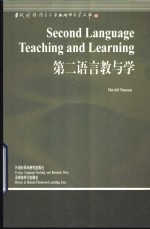

第二语言教与学 英文版PDF电子书下载
- 电子书积分:12 积分如何计算积分?
- 作 者:(英)David Nunan著;高远导读
- 出 版 社:北京:外语教学与研究出版社
- 出版年份:2001
- ISBN:7560023762
- 页数:339 页
PARTⅠ The Context of Second Language Teaching and Learning 1
CHAPTER1 The Conceptual Basis of Second Language Teaching and Learning 3
Humanistic Education and Experiential Learning 3
Communicative Language Teaching 9
Learner-Centered Education 10
Negotiated Curricula 16
Task-Based Language Teaching 24
Conclusion 34
References 36
CHAPTER2 The Empirical Basis of Second Language Teaching and Learning 38
Is Learning a Second Language Like Learning a First? 39
What Is the Role of Chronological Age on the Acquisition of a Second Language? 41
What Is the Effect of Instruction on Acquisiton? 42
What Is the Relationship Between Task Types/Modes of Classroom Organization and Acquisition 51
What Is the Relationship Between Learning Strategies and Acquisitions? 55
Conclusion 63
References 65
CHAPTER3 From the Traditional to the Contemporary In Second Language Teaching and Learning 69
Stimuli for Change 70
Syllabus Design 72
Approach to Teaching 74
Roles of Learners 75
Approach to Language 77
Using Language Texts 78
Facilities for Learning 81
Approach to Learning 82
Classroom Organization 83
Assessment 84
Language Out of Class 87
Conclusion 88
References 91
PARTⅡ Language,Learners,and the Learning Process 93
CHAPTER4 Focus on Language 95
Grammar and Grammaticality 96
Vocabulary 101
Pronunciation 105
Metaphors for Language Development 107
Language as Discourse 113
Creating Cohesion 117
Making Sense 127
Speech Acts 131
Background Knowledge 131
Pedagogical Implications 137
Conclusion 142
References 144
Learner Needs 148
CHAPTER5 Focus on the Learner 148
Learner Roles and Contributions 156
Learner Choices 164
Conclusion 166
References 169
CHAPTER6 The Learning Process 171
What Are Learning Strategies? 171
Introducing Strategies in the Classroom 172
Learning Strategies and Tasks 182
Encouraging Learner Independence 192
Conclusion 193
References 194
PARTⅢ Language Skills In Action 197
CHAPTER7 Listening 199
Listening in Another Language 200
Research Into Listening 205
The Role of the Learner in the Listening Process 209
The Database for Listerning Courses 212
Task Types 215
Conclusion 221
References 223
CHAPTER8 Speaking 225
The Nature of Speaking 226
The Reluctant Learner 231
Task Difficulty 236
Course Design Issues 237
Pedagogical Tasks 240
A Sample Speaking Lesson 242
Conclusion 245
References 247
CHAPTER9 Reading 249
Reading in Another Language 249
Research Into Reading 256
Task Types 262
Designing Reading Courses 266
Conclusion 268
References 269
CHAPTER10 Writing 271
The Nature of the Writing Process 272
Functional Grammar and Writing 278
A Discourse-Based Approach to Writing 287
Contrastive Rhetoric 296
Conclusion 298
References 299
GLOSSARY OF LANGUAGE LEARNING TERMINOLOGY 301
APPENDICES 317
INDEX 326
文库索引 331
- 《卓有成效的管理者 中英文双语版》(美)彼得·德鲁克许是祥译;那国毅审校 2019
- 《程序逻辑及C语言编程》卢卫中,杨丽芳主编 2019
- 《幼儿园课程资源丛书 幼儿园语言教育资源》周兢编 2015
- 《AutoCAD 2018自学视频教程 标准版 中文版》CAD/CAM/CAE技术联盟 2019
- 《跟孩子一起看图学英文》张紫颖著 2019
- 《高等学校“十三五”规划教材 C语言程序设计》翟玉峰责任编辑;(中国)李聪,曾志华,江伟 2019
- 《AutoCAD机械设计实例精解 2019中文版》北京兆迪科技有限公司编著 2019
- 《音乐语言的根基》张艺编著 2019
- 《认知语言学视野的抽象方位结构研究》曹爽著 2019
- 《激活语言思维》李蒨,王宏年,汤青编著 2017
- 《中风偏瘫 脑萎缩 痴呆 最新治疗原则与方法》孙作东著 2004
- 《水面舰艇编队作战运筹分析》谭安胜著 2009
- 《王蒙文集 新版 35 评点《红楼梦》 上》王蒙著 2020
- 《TED说话的力量 世界优秀演讲者的口才秘诀》(坦桑)阿卡什·P.卡里亚著 2019
- 《燕堂夜话》蒋忠和著 2019
- 《经久》静水边著 2019
- 《魔法销售台词》(美)埃尔默·惠勒著 2019
- 《微表情密码》(波)卡西亚·韦佐夫斯基,(波)帕特里克·韦佐夫斯基著 2019
- 《看书琐记与作文秘诀》鲁迅著 2019
- 《酒国》莫言著 2019
